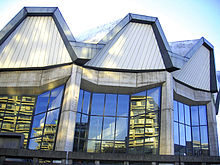Ruhr-Universität Bochum | |
 | |
| Motto | menschlich – weltoffen – leistungsstark[1] |
|---|---|
Motto in English | Humane – Cosmopolitan – Capable |
| Type | Public |
| Established | 1962 |
| Budget | € 539.1 million[2] |
| Rector | Martin Paul[3] |
Academic staff | 3,324[4] |
Administrative staff | 2,378[4] |
| Students | 42,425[4] |
| Undergraduates | 22,458[5] |
| Postgraduates | 9,814[5] |
| 3,619[5] | |
Other students | 7,223 international students[6] |
| Location | , , Germany 51°26′38″N 7°15′42″E / 51.44389°N 7.26167°E |
| Campus | Urban/Suburban Campus area 4.5 sq.km[7] |
| Colors | RUB-Blau, RUB-Grün |
| Affiliations | UARuhr, DAAD, DFG, Utrecht Network, UNIC Network, MAUI Network, AEN Network, NOHA Network |
| Website | www.ruhr-uni-bochum.de |
The Ruhr University Bochum (German: Ruhr-Universität Bochum, RUB) is a public research university located in the southern hills of the central Ruhr area, Bochum, Germany. It was founded in 1962 as the first new public university in Germany after World War II. Instruction began in 1965.
The Ruhr-University Bochum is one of the largest universities in Germany and part of the Deutsche Forschungsgemeinschaft, the most important German research funding organization.[8]
The RUB was very successful in the Excellence Initiative of the German Federal and State Governments (2007), a competition between Germany's most prestigious universities. It was one of the few institutions left competing for the title of an "elite university", but did not succeed in the last round. There are currently nine universities in Germany that hold this title.
The University of Bochum was one of the first universities in Germany to introduce international bachelor's and master's degrees, which replaced the traditional German Diplom and Magister. Except for a few special cases, such as law, these degrees are offered by all faculties of the Ruhr-University. Currently, the university offers a total of 184 different study programs from all academic fields represented at the university.[9]



- ^ Ruhr-Universität Bochum – Strategische PR und Markenbildung. "Porträt – Ruhr-Universität Bochum". Retrieved 21 July 2015.
- ^ "Accomplished". University of Bochum. Retrieved 21 July 2015.
- ^ "Rector". University of Bochum. Retrieved 15 February 2022.
- ^ a b c "Humane". University of Bochum. Retrieved 3 June 2017.
- ^ a b c "Statistics" (PDF). Retrieved 22 November 2016.
- ^ "Statistics" (PDF). Retrieved 22 November 2016.
- ^ Ruhr-Universität Bochum – Strategische PR und Markenbildung. "Facts and Figures – Ruhr-Universität Bochum". Retrieved 21 July 2015.
- ^ Pressestelle Ruhr-Universität Bochum – Online-Redaktion. "Deutsche Forschungsgemeinschaft – Ruhr-Universität Bochum". Retrieved 21 July 2015.
- ^ Ruhr-Universität Bochum – Strategische PR und Markenbildung. "High-performance – Facts & Figures – Ruhr-Universität Bochum". Retrieved 21 July 2015.